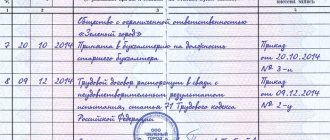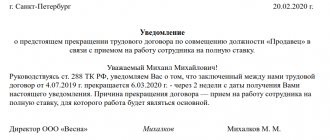The procedure for dismissal during a probationary period: rules of appointment and restrictions
The procedure for completing the probationary period is established in the Labor Code. The probationary period cannot exceed 3 months, 6 for management personnel, and 2 weeks when concluding a fixed-term contract (lasting from 2 to 6 months). The specifics of dismissal during a probationary period depend on whose initiative the employment contract will be terminated: the employee or the employer. After all, both of these parties are equal from the point of view of legislation, and each of them may have their own reasons for terminating the employment relationship. Thus, the initiative to terminate the contract during the trial period can come from both the employee and the employer: both parties to the employment contract have the right to declare their desire to end the relationship and draw up the relevant documents. Moreover, dismissal in these cases is regulated by different articles of the Labor Code of the Russian Federation:
- Article 71 of the Labor Code of the Russian Federation regulates the employer’s right to terminate an employment contract if the employee fails to fulfill his duties;
- Article 78 of the Labor Code of the Russian Federation regulates the termination of an employment contract by agreement of the parties if they both do not want to continue cooperation;
- Article 80 of the Labor Code of the Russian Federation regulates the dismissal of an employee at his own request.
There are categories of persons for whom such termination of employment is considered illegal. Such persons are listed in Article 261 of the Labor Code of the Russian Federation, they include, in particular:
- pregnant women (if it turns out that the employee hid her situation from the employer, the dismissal may be considered legal);
- women with children under three years of age;
- single mothers raising disabled children under the age of 18 or young children under the age of 14;
- other persons who raise such children without a mother;
- parents who are the sole breadwinners of disabled children under the age of 18 or children under the age of three in families with three or more young children, unless the other parent is in an employment relationship.
Payment of severance pay is not provided for by law in such situations. And if the management did not inform the new specialist that he is not suitable for the job before the end of the period specified in the employment contract, such reason for separation is automatically canceled.
Let's take a closer look at what other features are hidden by dismissal during the probationary period at the initiative of the employee and the company.
Possible reasons for dismissal
If the initiative to terminate relations with the enterprise during the trial period comes from the employee, then the reasons may be different; the citizen is not obliged to report them in the notification; the standard wording “at his own request” is sufficient. An employee may, in accordance with Art. 71 of the Labor Code of the Russian Federation, decide that the job is simply not suitable for him. Moreover, the employee can express such a desire at any time during the trial period; it is not necessary to undergo the entire test. for example all three months. The employer also has the right to take the initiative and carry out dismissal, but he will need to have really compelling reasons. Otherwise, the dismissal may be considered illegal.
The reasons for dismissal during the probationary period at the initiative of the employer may be the following:
- absenteeism, that is, absence from work for more than four hours in a row;
- failure to comply with established labor discipline (divulging secrets, appearing drunk, etc.);
- unprofessional behavior (committing an immoral act, etc.);
- committing an offense at the place of work (theft, embezzlement, damage or destruction of property, etc.).
All these reasons are indicated in Art. 81 of the Labor Code of the Russian Federation, but the employer may respond to such misconduct with other disciplinary punishment or even limit it to a warning (for example, if there are good reasons for absenteeism). The grounds for dismissal must be documented, an explanation must be requested from the employee, and a commission must be created to investigate the case. Also, if an unsatisfactory result of passing the probationary period is revealed, the employer is obliged to prove the identified incompetence of the employee. Thus, it is necessary in the employment contract, when formulating the test, to initially indicate what specific duties the employee must perform, to what extent, etc., so that subsequently the result of completing the probationary period can be reliably and accurately determined.
Due to unsatisfactory results of completing the probationary period, dismissal may take place before the expiration of 3 months. The legislator does not oblige the employer to wait until the end of the maximum probationary period established in the Labor Code of the Russian Federation, but there must be evidence of the employee’s inadequacy for the position or performance of work of inadequate quality.
Features of the situation
Any dismissal is an unpleasant procedure for both the employee and the employer.
Each of the reasons for dismissal during a probationary period has a number of features that you need to know.
If you resign of your own free will (personal reasons) and suddenly the situation changes radically, then you have the right to withdraw your application and continue working in the company/enterprise under the same conditions.
When dismissal occurs at the initiative of the employer, it is necessary to follow a certain procedure:
- Drawing up acts, memos with precise recording of these instructions and the results obtained.
- The presence of serious errors and inconsistencies in the work performed, recorded in writing.
- Drawing up reports of the employee analyzing his mistakes and indicating how to correct them in his work.
The documents provided must indicate the exact date. This will avoid charges of illegal dismissal.
After issuing a notice of dismissal, it is handed to the employee against his signature. If he refuses, this fact is subject to mandatory recording by a special commission. It is worth noting that the employer in this situation is not obliged to coordinate its actions with the trade union.
If you are the person being dismissed and consider the fact of payment from the company to be incorrect, the absence of the documents provided gives you every right to go to court and seek reinstatement.
When making payments at the end of the probationary period, the employer is required to provide a written explanation of its actions. Don't be afraid to demand them from him. This is your right, and it is guaranteed by the Labor Code.
Dismissal during a probationary period at the initiative of the employer: step-by-step instructions
Step 1. Serving the notice
Termination of an employment contract during the probationary period is possible only if this period is specified in the contract itself. The question of how to fire an employee who has not completed the probationary period worries many HR specialists more often than one might imagine. Unfortunately, many applicants cannot confirm their professional qualities and education or cannot withstand the pace of work and requirements in the new team. If such a problem occurs in an organization and management comes to the conclusion that the new employee is not suitable for the position offered to him, he must be notified that he did not pass the test. Such notice must be in writing. The document must state the reasons why this unpleasant decision was made. The document must be delivered to the addressee against signature, no later than three days before the planned date of separation. If an employee refuses to endorse a document offered to him, you need to draw up a statement about this fact, which must, in turn, be signed by at least two witnesses and the compiler (usually a human resources specialist).
To avoid litigation with a former employee who may consider himself unfairly dismissed precisely because of insufficient time to demonstrate his excellent knowledge and professional level, it is advisable not to terminate the employment contract in the first days of work. The optimal period for testing professional skills, as judicial practice shows, ranges from two to three weeks. Especially if the period for testing was initially chosen to be minimal.
In addition, strict compliance with all stages of dismissal before the end of the probationary period will be an excellent protection against possible recourse to court by an offended employee. In particular, violation of the notification procedure or the deadline for informing about the upcoming dismissal can already lead to the recognition of the termination of relations as illegal and the reinstatement of the unwanted employee at work. The fact of incompetence and unsatisfactory work in this case will no longer have legal significance. It is also necessary to have evidence of this very incompetence and that the dismissed citizen really failed to cope with his responsibilities. Such evidence may be:
- management memos;
- explanatory or internal notes from the employee himself;
- testimonies from colleagues.
In order to clearly show which requirements the employee could not fulfill, he must be familiarized with these requirements in advance. That is, give him to read all local regulations and job descriptions relating to his duties. The fact of familiarization must be certified by the personal signature of the employee. This is regulated by Article 68 of the Labor Code of the Russian Federation.
Customer complaints, and most importantly, documents on the application of various disciplinary sanctions against him can tell about the poor performance of the dismissed person, these can be:
- acts of identified misconduct;
- explanatory;
- orders to impose penalties.
If there is no documentary evidence confirming the employee’s professional unsuitability, and his dismissal is related to the subjective feelings of management, it is better to try to negotiate and formalize the dismissal differently - by agreement of the parties. In this case, the employee will receive a more favorable entry in the work book, which, moreover, he will not be able to challenge in court, as well as his dismissal, which is already in the favor of the employer.
It is also worth remembering that, according to Article 71 of the Labor Code of the Russian Federation, it is impossible to terminate relations with employees who fall ill on the day of dismissal. Therefore, if on the planned date the employee is on sick leave, it is best to postpone his dismissal. This is due to the ban on dismissal during illness or vacation, which is regulated by Article 81 of the Labor Code of the Russian Federation, but equally applies to the probationary period. It is better to wait until the employee is healthy and can begin his duties.
Step 2. Paperwork
Registration of termination of an employment contract occurs in the usual manner.
First, an order is issued for the company, which can be either in a free form or in a unified T-8 form.
Sample of a completed order
In addition, the employee must receive a calculation note, which is also filled out on a unified form or compiled in a program by accounting employees. It looks something like this:
On the reverse side of such a note, the accounting department must calculate the vacation days that the person managed to earn, as well as the amount of wages and all deductions from it. After drawing up and approval, this document is handed over to the employee along with the money. You also need to promptly submit your work record book, statement of work experience and other documents (even if the period of work is only a few days), as well as pay all amounts of salary and vacation pay accrued in favor of the individual. After which the procedure can be considered complete.
The design of a work book in this case has some specific features. Dismissal during a probationary period is regulated by a separate norm of the Labor Code of the Russian Federation - Part 1 of Article 71. Therefore, when making an entry in the work book, it is imperative to provide a link to this norm and decipher that the employment contract is terminated on this basis. The wording, in accordance with clauses 15, 18 of the Rules approved by Government Decree No. 225 of April 16, 2003, should be as follows:
“the employment contract was terminated due to unsatisfactory test results, part 1 of article 71 of the Labor Code of the Russian Federation.”
The employee can reach an agreement with the employer and formalize the termination of the contract at his own request.
Step 3. Calculate and make payments and deductions upon dismissal during the probationary period
Here it is necessary to remember that during the probationary period the employee is subject to all the norms of the current labor legislation. Accordingly, the employee has the same rights as others for whom no test is established.
Therefore, upon dismissal during the probationary period, the employee receives the following payments and compensations:
- earnings, fees for actual time worked;
- compensation for unused vacation;
- in case of liquidation of the organization or reduction of staff - severance pay.
All payments are made on the last working day. The employee is also given a work book with all the required entries and marks.
Dismissal during a probationary period at the initiative of the employee
A citizen employed under probationary conditions can resign at his own request at any time. He is also subject to a shortened period of notice of his intention to leave his job. The corresponding application must be submitted at least three calendar days before the desired date of care. This notice period lasts throughout the trial, even if you apply on the last day. It is possible to resign early by agreement with management. Typically, such agreements are reached in the first working days if there is a mutual feeling between superiors and subordinates that they are not suitable for each other. All documents in this case are drawn up in accordance with the general procedure.
Sample application for dismissal of an employee during the probationary period
To the Director of Primer LLC
Getmanov O.N.
from a sales specialist
Koshkin Marat Sergeevich
Application for voluntary resignation
In accordance with Art. 80 of the Labor Code of the Russian Federation, I ask you to dismiss me at your own request on April 15, 2021.
Date: 03/28/2019 Koshkin's signature.
An application for dismissal during the probationary period is submitted in writing directly to the employer’s manager or to the human resources department. There is no approved or unified form for such a document; the employee draws it up in free form. But it is important to remember some rules and mandatory details.
The application contains three blocks: the header, the main part and the details of the date and signature. The header lists the addressee and the applicant (identifying data must be indicated: the position of the manager, the name of the company, his surname, first name and patronymic, position and surname, first name, patronymic of the employee). Next, the main block must be separated by the word “statement”. In the body of the document, it is necessary to accurately and clearly express the desire to formalize the dismissal during the probationary period; a reference to the regulatory justification is not required. The date of termination of the relationship must be indicated. At the bottom of the document you need to put a date and a personal signature with a transcript. It is better to make two completely identical copies of the document in order to obtain an employer representative visa on one. This document will be proof that the employer’s representative has been served with a letter of resignation during the probationary period.
Separately, it should be noted that the employee has the right to withdraw his application before the expiration of three days after its submission. In addition, if the boss has already notified the unlucky specialist that he has not passed the test, he has the right to submit a counter-application of his own free will. In this case, the manager will choose which article to write down in the work book. In such a situation, lawyers advise meeting the employee halfway and replacing the reason from an unsatisfactory qualification test result to Article 80 of the Labor Code of the Russian Federation - one’s own desire. This is due to the fact that such an article excludes conflicts and subsequent legal proceedings.
During the probationary period, the employee is subject to all provisions of labor legislation. This is established in Art. 70 Labor Code of the Russian Federation. Thus, he is also subject to the requirement to work before dismissal. The employer has the right to demand work within three days established in Art. 71 of the Labor Code of the Russian Federation (the period during which the employee is obliged to notify the company of his desire to resign). Just as in the general case, you can agree on dismissal during the probationary period without working, the employer may also not be interested in this. If the parties reach mutual understanding on this issue, the relationship is terminated without further processing for an additional 3 days.
Entry in the work book
If you are registered with an enterprise using a work book, the organization’s human resources department must make an entry in it about the reason for your dismissal. It does not include any mention of disciplinary sanctions and reprimands during the probationary period.
An entry in the work book may not be made if the employee has worked at the enterprise for less than five days.
If an employee pays the company at the end of the probationary period, a record of failure to complete this period may not be made in the labor record. According to the Labor Code, it is enough to make a reference to the order by which the employee was dismissed.
Work upon dismissal is a standard requirement under the Labor Code of the Russian Federation. Dismissal at one's own request without service is possible only in exceptional cases. We will consider what these cases are in the article.
You will find all the legal details about the dismissal of an employee at the initiative of the employer in this material.
Peculiarities of dismissal of a part-time employee who has not completed the probationary period
Establishing a test for part-time workers is not prohibited by law. Dismissal of a part-time worker during the probationary period is possible both at the initiative of the employee and the employer. If a part-time contract is terminated, the employee can continue to work in his main function (if the contract is terminated based on the results of a trial or at the request of the employee, that is, not as a result of a violation of the established terms of interaction by the employee). All other rules remain the same: 3 days notice is required, the manager must justify his decision, but the employee may not do this. Additionally, in accordance with Art. 288 of the Labor Code of the Russian Federation, a part-time employee may be dismissed if an employee is hired for whom it will become the main one.
Entitled payments
Labor legislation provides that a person signed up for a probationary period under an employment contract has the right to receive all payments established by law.
On the day of dismissal, the employee can receive all wages for days worked. It is also possible to arrange payment of monetary compensation if there is a period of unused vacation.
For your information:
The management of the enterprise lists all the amounts that were specified in the contract. This issue is regulated by Article 140 of the Labor Code of the Russian Federation.
Typical employer mistakes for which the State Tax Inspectorate fines
The following mistakes should be avoided:
- long delay in formalizing relationships. The employment contract must be drawn up and signed within 3 days after the employee begins to perform duties. The contract must include a test; if this is not done, then such a condition is considered not included in the contract. Thus, the delay in drawing up the contract makes it impossible to include a test clause in it;
- unreasonable decisions. Dismissal during a probationary period by decision of the company administration must be justified. It is necessary to draw up a package of documents and an evidence base. Otherwise, dismissal during the probationary period may be considered illegal. Termination of a relationship without sufficient grounds should be avoided;
- poor information to the employee. He must be familiarized with all current local regulations, internal labor regulations, etc., so that he does not have the opportunity to plead ignorance when challenging management decisions. All documents when hiring and dismissing must be drawn up correctly (they must contain the employee’s notes that he is familiar with it), all wording must be as specified in the law;
- violation of the original conditions. This is unacceptable in an arbitrary manner; the law provides for a special procedure;
- inaccuracy of wording. When registering dismissal during a probationary period, it is necessary to comply with all formalities and rules and be sure to obtain all signatures of the employee;
- lack of precise terms. The contract must specify the purpose of the test in accordance with the wording of the law.
When terminating a contract, the formalities established by law must be strictly observed.








